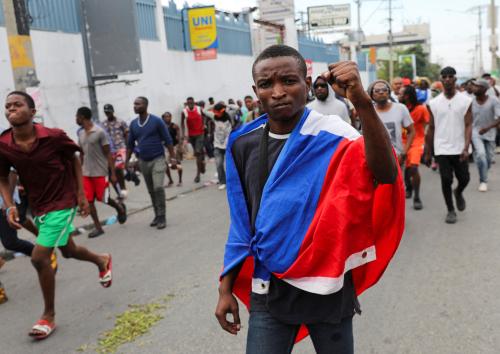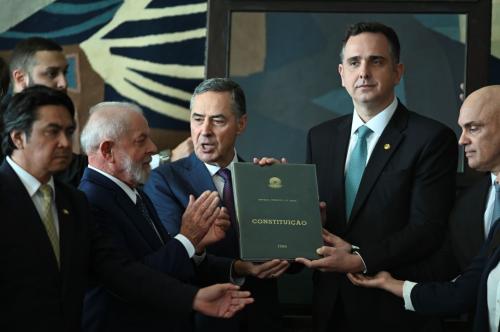Conservative cattle rancher Porfirio Lobo handsomely won the presidential election in Honduras. Despite skepticism in much of the world and a relative dearth of foreign observers, it seems clear that Hondurans turned up at the polls in decent numbers, that the election was largely devoid of violence, and that it met international standards. A group of countries led by the U.S., Honduras’s vital ally and trade partner, has already announced that they will recognize Lobo’s victory. This means that despite the objections raised by several Latin American countries the election will stand, a new government will be ushered in, and the stain of the June 28 coup will be duly removed. Given the harsh and unanimous international reaction that met the coup, this turn of events should be counted as a great victory for Roberto Micheletti, the de facto president of the country for the past five months. Alas, it is not a victory for Honduras or democracy.
The problem is not the recognition of the election. This is better than not recognizing it, which was always the surest way to prolong this sorry episode. The real problem here is how this outcome came to be and how it has been interpreted by the winners. It is one thing to convince the international community to turn a blind-eye to a crass deposition of a legitimate president; it is quite another to achieve that without paying any price whatsoever for it.
Indeed, one would have hoped that the elusive prize of international legitimacy for the next Honduran government would have implied guarantees that a meaningful process of national dialogue would be set in motion, a process in which the zelayistas—and probably Zelaya himself—ought to take part. One would have also hoped that it would have implied an effort to rethink and amend a surreal constitution that leaves the country vulnerable to future democratic breakdowns. And finally, that it would have led to a serious introspection amongst the Honduran elite and a willingness to introduce some social reforms, desperately needed in a country afflicted by the pervasive poverty and obscene inequalities that make populism an irresistible temptation.
Despite the lip service paid by Lobo upon proclaiming his victory, it is highly unlikely that any of this will happen now that the threat of international isolation has been removed. This will be a tragedy for Honduras. To paraphrase Rahm Emanuel’s felicitous expression, this crisis will have been utterly wasted.
Following the bizarre episode of the U.S.-brokered “accord” between Micheletti and Zelaya of a few weeks ago, which should have led to Zelaya’s reinstatement but didn’t, it is clear that the Honduran political elite are reading this outcome as an unconditional victory and, above all, as a license to return to politics as usual, as though nothing had happened. A license, that is, to go back to the usual process wherein factions of a well-heeled oligarchy–cheered on by an impoverished populace—fight tooth and nail for the spoils of a weak state, a dysfunctional creature able to enrich a few but utterly unable to do anything about the dismal reality of underdevelopment. With such a political style and such political leadership–revealed in the nakedness of its ambition by this episode—it is no wonder that Honduras stands at the rock bottom of corruption in Central America, according to the figures just released by Transparency International. And, by the way, this is no vindication of Manuel Zelaya, an irresponsible politician who is as much a part and a product of the Honduran elite as anybody. This is just a lament for a poor country that deserves better stewardship. I’m afraid that the shortcomings of the rotten political system that dooms Honduras simply have been crystallized by the outcome of this crisis.
If this is a victory for Micheletti and the elite he represents, it is a defeat for almost everybody else. It is for Zelaya, who played his hand poorly, who with his unsurpassed ability to ramble, confirmed all the prejudices about him, and who understood way too late that earning miles in Hugo Chávez’s plane was not the shortest route to regaining the presidency. He will go down in history as the single biggest culprit of triggering this crisis, and as a man who was right about something (revising the Honduran constitution) but for the wrong reasons (to tamper with term limits and reelection clauses). He doesn’t have a political future other than being exhibited as a cause célèbre at all the future jamborees organized by Chávez and his ALBA colleagues. It is a defeat for Chávez, who was left out of the picture by all the relevant actors–including Zelaya—months ago, and who will not have a friend in Tegucigalpa now that Lobo has been elected. It is a defeat of sorts for Brazil, which after being thrown at the center of the crisis by Zelaya’s decision to seek shelter at the Brazilian Embassy, missed the chance to deploy its regional influence to craft an adequate political settlement. It may be that Brazil simply doesn’t care about Central America, too close geographically and historically to the United States. Perhaps. Seen from a different angle, however, this episode provides yet another example of the fundamental tension that bedevils Brazil’s foreign policy: Brazil wants to be a Latin American hegemony – even the United States seems to expect Brazil to play that role. However, there is no evidence that it is willing to invest the political capital, make the difficult decisions, and bear the security and diplomatic responsibilities that come with the job.
It is a resounding defeat for the OAS, which is left in tatters, incapable of protecting the lofty goals of the Inter-American Democratic Charter and unable to bridge not just the traditional divide between the hemisphere’s North and South, but now also the ideological rift that is threatening to split Latin America. In particular, the fact that the United States and Brazil are publicly at odds about the recognition of the Honduran election will very likely accelerate a process in which Brazil –and not just Brazil— seems increasingly interested: abandoning the OAS to its fate and replacing it with other regional outfits, such as UNASUR, where Brazil can wield its power more freely.
Finally, it is failure for U.S. diplomacy, which shifted from indignation with the June 28 coup to indifference, then confusion, and finally acquiescence, all of it in less than five months. The crisis laid bare the total lack of a coherent approach towards Latin America at both the State Department and the White House. In particular, the United States will pay a price for the collapse of the so-called agreement between Micheletti and Zelaya, heralded as a diplomatic triumph by everyone from Secretary of State Clinton to Senator Kerry. Before the champagne stopped fizzling, the big triumph morphed into a big embarrassment, when it became clear that the Honduran Congress had no intention of reversing the coup by reinstating Zelaya before the election. There are two ways to interpret this fiasco, and neither of them reflects kindly on U.S. diplomats. Either they announced the accord believing that the votes in the Honduran Congress were there to reinstate Zelaya, in which case they were taken for a ride by the Honduran political elite, or they announced it knowing full well that the votes were not there and they were making public Zelaya’s capitulation and the coup’s ultimate consolidation. In the former hypothesis, they behaved with remarkable incompetence; in the latter, with remarkable cynicism. In both cases, the credibility of U.S. diplomacy to intervene in future political crises in Latin America is damaged.
Maybe that’s exactly what the State Department wants, to steer clear of disputes in Latin America, a minor headache in the big scheme of things. However, a lot of people, in Latin America and beyond, will take note. While I don’t think that there’s an immediate risk that Honduras’ coup can be easily replicated elsewhere in Latin America, Micheletti’s ability to make the United States dance to his own tune will nevertheless be recorded and remembered by other oligarchies in the region, whenever a president starts showing dangerous signs of heterodoxy in the future. Moreover, the U.S. inability to help craft (impose?) an adequate political solution to a petty power struggle in Honduras, raises legitimate questions about the United States’ prowess in dealing with the truly complex conflicts in the world. If they couldn’t handle Honduras, think about the Middle East. We all know that, while still number one, the United States has seen its capacity to determine what happens in Latin America and the world diminish. I just didn’t know that the loss of power was so glaring.
Hence, even after the election, there’s not a lot to gloat about in the outcome of this hapless episode. Micheletti and Lobo are simply the last men standing on a barren landscape. Their victory is a hollow one. Make no mistake – this is no victory for democracy.



Commentary
Op-edNo Victory for Democracy in Honduras
December 1, 2009